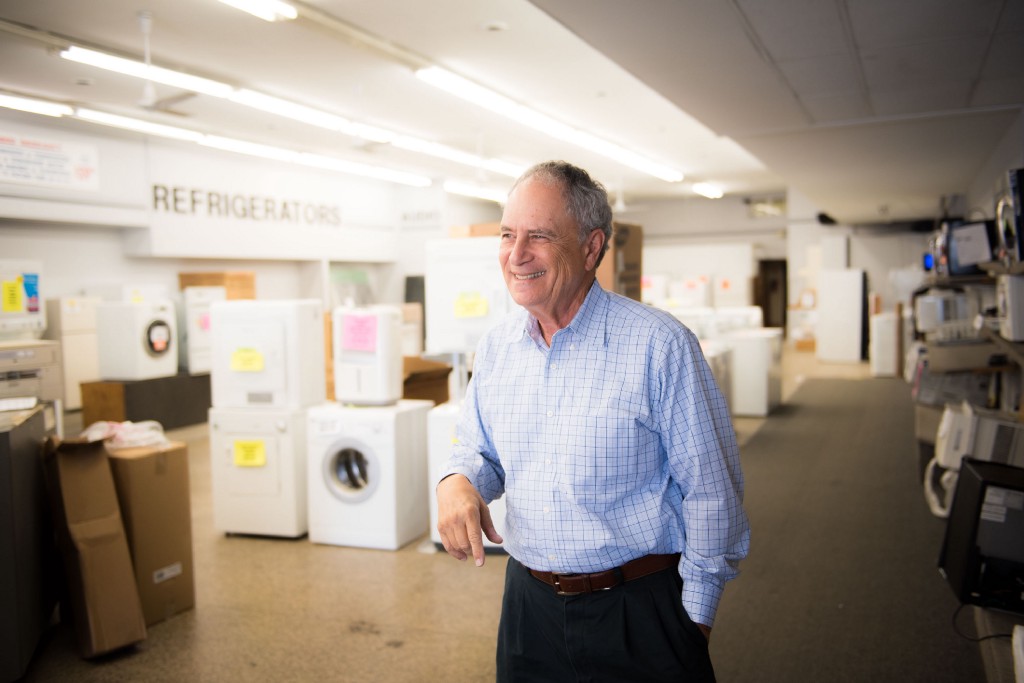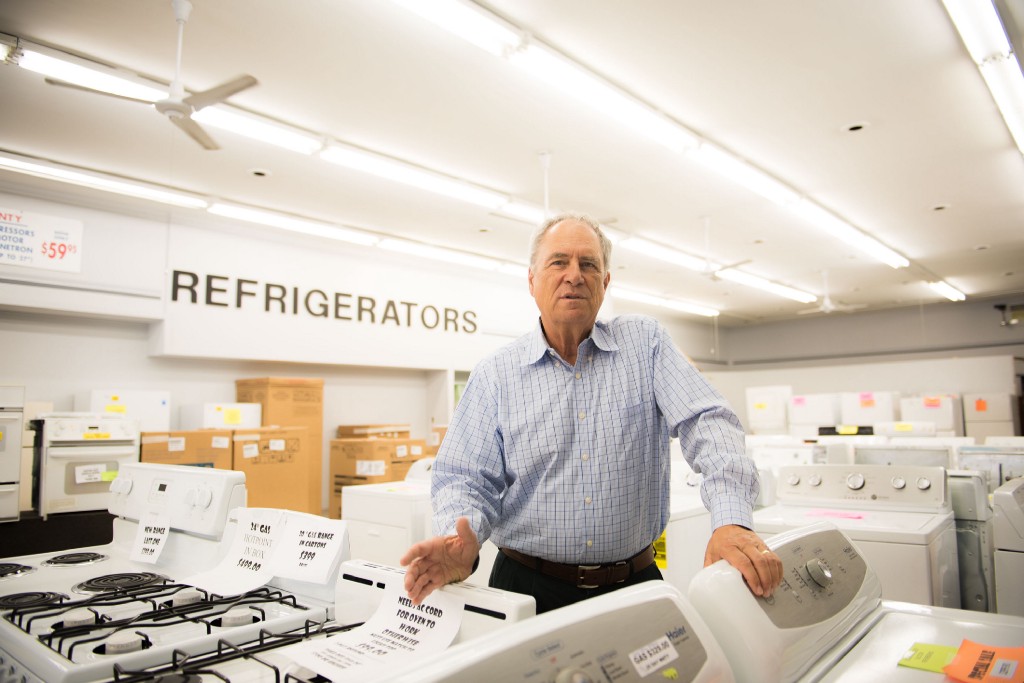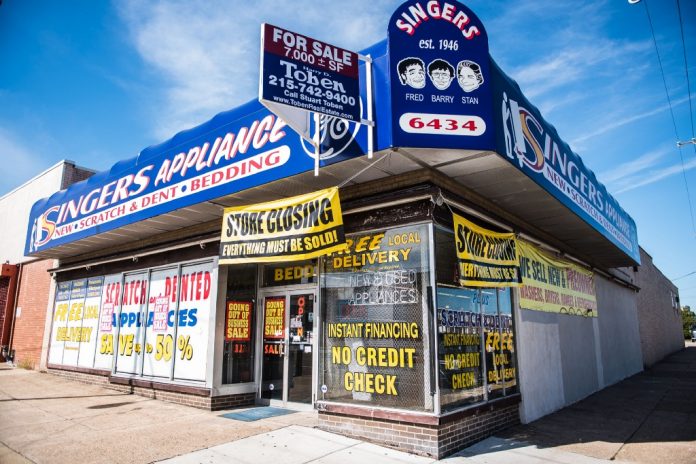MARIA S. YOUNG / TIMES PHOTO
Abe Singer didn’t invent television, although he was obviously paying close attention when two companies with strong Philadelphia-area ties, RCA and Philco, helped pioneer the technology in the 1930s and early ’40s.
Nor did Singer have a hand in creating the programs that popularized the medium in the post-World War II era, such as NBC’s Today and The Tonight Show, ABC’s The Mickey Mouse Club and CBS’ I Love Lucy.
Yet Singer’s vision, perhaps as much as anyone’s, made television accessible to common people, Northeast Philadelphia’s version of the G.I. Generation and its formidable heirs, the baby boomers and Gen-Xers. Singer founded a small appliance store in 1946 on Castor Avenue in Oxford Circle that would grow and mostly thrive for the next 69 years, largely on the power of the small screen to captivate the populace.
Singers Appliance Company, which began in a storefront near Castor and Benner Street and eventually relocated for good to a corner showroom at Castor and Stirling, will be closing within weeks, according to Fred Singer, son of the late founder. Several factors contributed to the decision.
Fred Singer has for years been contemplating retirement, having joined his father in the business in 1964. More recently, his younger brother and partner, Barry, decided to turn his attentions elsewhere, according to Fred. A third brother, Stan, left the business more than two decades ago. The next generation is looking elsewhere, too.
“Our children are not interested in retail, working six days and three nights a week,” Fred Singer said. “With the economic and personal issues, we felt it was the right time.”
The owners haven’t set a firm closing date, but will be phasing out retail operations over the next several weeks. They plan to honor and assist customers with product warranties beyond the closing, Fred Singer said.
Like much of American society, the lifespan of Singers Appliance has been a reflection of the evolution of the television industry, although the business was no mere TV shop. From the outset, it offered a full spectrum of modern conveniences like refrigerators, washers, dryers and range ovens.
Abe Singer had been a schoolteacher for about 10 years and operated a hotdog stand in Wildwood during the summers. But with a wife, Gertrude, and a growing family, he determined that he needed something more. Using his hotdog proceeds, he bought “a little electric appliance store,” Fred said. The family lived in an apartment above the store for about four years.
Television was about to explode. There were about 6,000 television sets in use in the United States in 1946. By 1951, there were about 12 million. By 1955, half of all American homes had at least one set.
In 1950, Abe Singer moved his shop a few blocks north, across the street from the present-day showroom.
“After World War II in the Northeast, you had a lot of people moving in,” Fred Singer said. “They were buying these row homes that were all new. They had the G.I. Bill and went to college and became teachers or government employees. There was a growing middle class.”
The public school system was growing, too, with new buildings sprouting around the Northeast. Fred Singer seemingly attended most of them, including Laura H. Carnell and J. Hampton Moore for grade school, Woodrow Wilson and Samuel Fels for junior high, followed by Lincoln and Northeast high schools. His destiny was pretty certain by then.
“My father said to us, ‘You get a college degree and I’ll let you into the business,’” Fred Singer said.
That’s exactly what he did in 1964, the same year his father moved the shop once more to its familiar present-day location. Poster-size photos from the grand opening still line the walls of the showroom, depicting black-and-white images of giddy shoppers frolicking through the aisles in sports jackets, skinny ties, evening dresses and pearls. There is a retro formality evident in the snapshots.
“It was really the black and white era up until then,” Fred Singer recalled.
Shopping options were relatively limited then, too.
“You had department stores, but not strip malls, so people walked to the avenue to shop, like Castor Avenue or Bustleton Avenue,” Fred Singer said, noting that many households didn’t have a car while few if any had more than one. So everybody walked.
Abe Singer continued working for another dozen years, retiring in 1976. Color TV had replaced the old black and white as the dominant format. Soon, too, would strip malls and large warehouse stores undermine avenue shopping and the appliance business.
Singers tried to expand with stores in the growing Parkwood community and another near the Krewstown Shopping Center, but both proved more burdensome to the operation than profitable.
“We found it was easier to control your expenses with one store,” Fred Singer said.
Singers faced stiff competition from larger stores and chains like Silo’s and Lit Brothers, but it had a secret weapon — the faces of its owners. Much like Pep Boys’ Manny, Moe and Jack, caricatures of Fred, Barry and Stan Singer became a hallmark of the family business. The drawings are still in use, featuring prominently on the awning over the store’s front door. They represent a way of doing business.
“We were always talking about personal service and how one of the owners is always there for you, whereas with our competitors at the time you never got to see the owners,” Fred Singer said. “The idea was you could always meet Fred, Barry or Stan.”
In more recent times, the proliferation of big box stores has dealt another blow to mom-and-pop businesses like Singers. Among dozens of nearby storefronts, Fred Singer can think of only one, a hardware store, with longevity spanning multiple generations. There’s not much the little guys can do to compete on pricing or selection with Best Buys of the world. Even stores like Home Depot are selling refrigerators these days.
“They use appliances as almost a loss leader. They’ll sell certain things almost at cost to get people into the store,” Fred Singer said.
Singers doesn’t even sell televisions or stereos anymore. Business has been helped by the addition of scratch and dent merchandise to the inventory. After all, the economic profile of the neighborhood has been changing, too.
“This part of the Northeast has seen a transition into a younger clientele with a lower-middle income,” Singer said. “They can’t afford to buy the better models. They’re looking for the basic product.”
That means smaller profit margins for the neighborhood merchants.
Fred Singer isn’t viewing the imminent store closing with regret, however. Sentimentality, yes, but second thoughts, no.
“I’ll miss the people, of course, the customers and employees,” he said. “The relationships. Dealing with people can be a very rewarding business, if they have a need and you’re fulfilling their need with good results. The ultimate reason we’re closing the business is because we wanted to keep our name and our legacy.” ••

MARIA S. YOUNG / TIMES PHOTO

End of an era: Singers Appliance Company, which opened in 1946, will be closing within weeks, according to Fred Singer (above), son of the late founder. MARIA S. YOUNG / TIMES PHOTO





